2 Jun2 2023 : Daily Current Affairs
DAILY CURRENT AFFAIRS
- DAILY CURRENT AFFAIRS
- 1. GST collections cross ₹1.5 lakh cr. for the fifth time, up 11.5% in May
- 2. The virtues and challenges of Kathakali in a contemporary world
- 3. Who should own the world’s lithium?
- 4. India, Nepal sign pacts on energy, transport
- 5. India and China hold talks on LAC issue in New Delhi
- 6. Sedition law can be retained but with safeguards
- 7. Half of electricity to be from renewable sources by 2027.
- 8. Pakistan posts record inflation for second consecutive month
- 9. RBI should adopt neutral policy stance as inflation cools.
- For Enquiry
2-June-2023
Daily Current Affairs For UPSC ,Daily Current affairs of The hIndu and Indian Express.
1. GST collections cross ₹1.5 lakh cr. for the fifth time, up 11.5% in May
Topic: GS3 – Indian economy.
Context:
-
-
-
Gross Goods & Services Tax (GST) collections in May grew by 11.5%, the slowest growth rate in six months, reaching over ₹1.57 lakh crore.
-
-
Issue:
-
-
-
Revenues from domestic transactions rose by 11% compared to the previous year, while imports yielded 12% more taxes.
-
Sequentially, May’s revenues were the lowest in three months and 16% below the record collection of ₹1.87 lakh crore in April.
-
This marks the 14th consecutive month that GST revenues have exceeded ₹1.4 lakh crore and the fifth time they surpassed the ₹1.5 lakh crore mark.
-
ICRA’s chief economist, Aditi Nayar, predicts that GST revenue growth will likely remain in the range of 10%-11% in the coming months, with revenues expected to be between ₹1.55 lakh crore and ₹1.65 lakh crore.
-
Ongoing efforts against indirect tax evasion and increased consumption spending with the withdrawal of ₹2,000 currency notes, which remain legal tender until at least September 30, could potentially boost collections.
-
-
2. The virtues and challenges of Kathakali in a contemporary world
Topic: GS1 – Indian art and culture.
Issue:
-
-
-
Kathakali remains relevant to today’s audiences through its aesthetic combination of music, drums, and dance, but understanding the stories and context enhances appreciation.
-
The introduction of microphones and modern acoustics has revitalized Kathakali music and attracted a younger audience.
-
Financially and socially, the situation for Kathakali artists is challenging, with only a few enjoying stability. Many survive by teaching or assisting choreographers.
-
Koodiyattam, another traditional art form, cannot be compared to Kathakali and has a niche appeal with a smaller audience.
-
Kathakali has seen some dilution and a focus on middle-brow tastes, resulting in a stronger emphasis on the story (katha) rather than the dance-theatre (kali) aspect.
-
Many scholars express their agreement with the notion that modern Kathakali is primarily focused on storytelling rather than the full dance-theatre experience.
-
-
3. Who should own the world’s lithium?
Topic: GS3 – Indian economy.
Context:
-
-
-
The potential reserves of lithium in Jammu and Kashmir have been welcomed as a boost for India’s national prosperity and security.
-
-
Issue:
-
-
-
India’s electric-vehicle market is expected to reach $152.21 billion by 2030, making the development of domestic lithium reserves crucial.
-
The ownership of minerals is a complex issue, with public lands in India and the rights of landowners under debate.
-
Countries like Chile and Bolivia have taken different approaches to managing their lithium reserves, with Chile designating it as a strategic resource and Bolivia nationalizing the industry.
-
Mexico has also nationalized lithium, emphasizing that it belongs to the nation.
-
Effective and careful management of India’s lithium sector is necessary to ensure social well-being, environmental safety, and national energy security.
-
The involvement of Indigenous Peoples and consideration of their rights and environmental concerns are important aspects of lithium development in Latin and South American countries.
-
India must prioritize effective state management and address issues of poverty, environmental degradation, and regulation in mining regions to achieve its goals.
-
-
4. India, Nepal sign pacts on energy, transport
Topic: GS2 – International relations..
Context:
-
-
-
Indian Prime Minister Narendra Modi welcomed Nepalese Prime Minister Pushpa Kamal Dahal ‘Prachanda’ on his visit to India.
-
Both leaders emphasized the importance of not allowing the India-Nepal border to become a barrier.
-
-
Issue:
-
-
-
The two countries signed agreements on energy and transport, including the export of Nepal’s hydropower to Bangladesh through Indian territory.
-
India and Nepal signed a Transit Agreement to facilitate Nepal’s population’s access to India’s inland waterways.
-
A long-term Power Trade Agreement was signed, with a target of importing 10,000 MW of electricity from Nepal to India in the future.
-
The development of hydroelectric projects and the Pancheshwar multipurpose project were discussed.
-
The revised Treaty of Transit was signed, granting Nepal access to India’s inland waterways.
-
Prime Minister Modi also emphasized the strong cultural ties between the two countries and called for fast-tracking projects related to the Ramayana circuit, which focuses on promoting religious tourism
-
The leaders inaugurated a cargo train and integrated checkposts at various locations.
-
-
5. India and China hold talks on LAC issue in New Delhi
Topic: GS2 – International relations.
Context:
-
-
-
The first in-person India-China border talks in over four years took place in New Delhi.
-
The meeting was held between the Working Mechanism for Consultation and Coordination on India-China Border Affairs (WMCC).
-
-
Issue:
-
-
-
No significant progress was reported in the negotiations to disengage along the Line of Actual Control (LAC).
-
The Indian delegation was led by Shilpak Ambule, Joint Secretary (East Asia) of the Ministry of External Affairs, and the Chinese side was led by Hong Liang, Director-General of the Boundary and Oceanic Affairs Department of the Ministry of Foreign Affairs.
-
The two sides discussed proposals for disengagement in the remaining areas along the border and reviewed the situation in the Western Sector.
-
The Indian statement emphasized the restoration of peace and tranquillity as a prerequisite for normalizing bilateral relations.
-
The Chinese statement focused on implementing the consensus reached by the Foreign Ministers, maintaining communication, and holding the 19th round of military-level talks soon.
-
China has been accused of dragging its feet in the disengagement process and has sought to separate the border issue from other aspects of the relationship, a stance rejected by India.
-
-
6. Sedition law can be retained but with safeguards
Topic: GS2 – Indian polity
Context:
-
-
-
The 22nd Law Commission of India has recommended retaining Section 124A of the Indian Penal Code (IPC), which deals with sedition.
-
-
Issue:
-
-
-
The commission suggests making amendments to provide greater clarity regarding the usage of the sedition law and curb its misuse.
-
It proposes that the central government issue model guidelines to prevent the misuse of Section 124A.
-
The commission suggests incorporating a provision similar to Section 196(3) of the Code of Criminal Procedure (CrPC) as a safeguard before filing a First Information Report (FIR) for an offense under Section 124A.
-
The reference for the study of Section 124A and the recommendation for amendments came from the Home Ministry in 2016.
-
The report argues that the existence of other laws, such as the Unlawful Activities (Prevention) Act and the National Security Act, does not cover all elements of the offense outlined in Section 124A.
-
The report acknowledges the colonial origins of the sedition law but argues that simply being colonial does not justify its repeal.
-
The commission believes that procedural guidelines can be established to prevent misuse of the sedition law, as misuse of various laws is a common occurrence and can be addressed through procedural safeguards.
-
-
7. Half of electricity to be from renewable sources by 2027.
Topic: GS3 – Energy sector.
Context:
-
-
-
India’s target of sourcing half of its installed electricity from renewable sources by 2030 may be achieved early, by 2026-27, according to the Central Electricity Authority (CEA).
-
-
Issue:
-
-
-
The CEA’s National Electricity Plan (NEP) projects that the share of non-fossil fuel capacity will increase to 57.4% by the end of 2026-27 and potentially reach 68.4% by 2031-32.
-
However, the availability of power from renewable energy sources is limited by factors such as varying efficiencies and intermittent availability of solar and wind energy.
-
The NEP estimates that renewable energy will contribute around 35.04% of the total generated electricity by 2026-27 and 43.96% by 2031-32, considering the limitations of renewable power availability.
-
Independent experts consider the NEP targets to be ambitious but feasible, particularly with the government’s commitment to adding 50 GW of renewable energy capacity annually.
-
-
8. Pakistan posts record inflation for second consecutive month
Topic: GS3 – Economy – inflation.
Context:
-
-
-
Pakistan’s annual inflation rate reached 37.97% in May, setting a national record for the second consecutive month.
-
-
Issue:
-
-
-
This high inflation rate adds to Pakistan’s existing challenges, including a balance of payment crisis and the risk of a sovereign default.
-
In April, Pakistan’s Consumer Price Index (CPI) reached 36.5%, the highest recorded in the country and in South Asia.
-
The month-on-month rise in May was 1.58%, primarily driven by increased prices of food items such as vegetables, pulses, wheat, wheat flour, rice, eggs, and chicken, as well as fuel and gas.
-
The inflation surge is a result of fiscal adjustments implemented by the government to meet the demands of the International Monetary Fund (IMF) and unlock funding. These measures involve the withdrawal of subsidies, higher energy prices, and new taxation to generate additional revenue.
-
-
9. RBI should adopt neutral policy stance as inflation cools.
Topic: GS3 – Indian Economy.
Context:
-
-
-
The president of the Confederation of Indian Industry (CII), R. Dinesh, believes that the Reserve Bank of India (RBI) should shift to a neutral monetary policy stance due to cooling inflation expectations.
-
-
Issue:
-
-
-
He called for consensus on critical pending reforms in sectors such as labour, land, power, and agriculture.
-
The CII expects GDP growth to be around 6.5% to 6.7% in 2023-24, and suggested that reforms like a universal Goods and Services Tax (GST) and improved contracts enforcement could boost growth to an average of 7.8% between 2022 and 2031.
-
According to a CEOs’ survey conducted by the CII, nearly 72% of corporates expect inflation to moderate to less than 5% this year.
-
Mr. Dinesh indicated that India’s investment rate, measured by gross capital formation to GDP, may reach or surpass the five-year high of 33.9% achieved in 2017-18 in the near to medium term.
-
Despite potential challenges like the global economic slowdown and higher borrowing costs, he expressed confidence that strong public capital expenditure and sustained domestic demand would outweigh these obstacles.
-
-
For Enquiry

2 Jun2 2023 : Daily Current Affairs
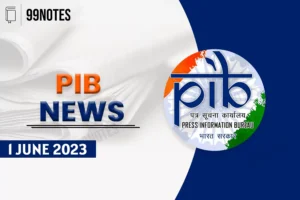
1 June 2023 : PIB
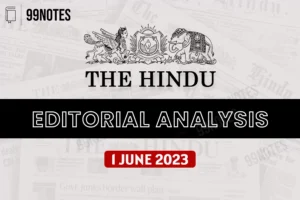
1 June 2023 : The Hindu Editorial

1 June 2023 : Daily Current Affairs
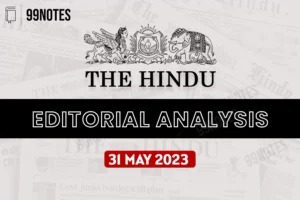
31 May 2023 : The Hindu Editorial
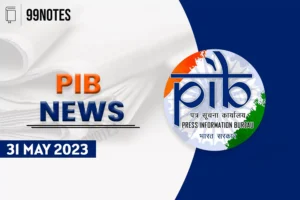
31 May 2023 : PIB

31 May 2023 : Daily Current Affairs
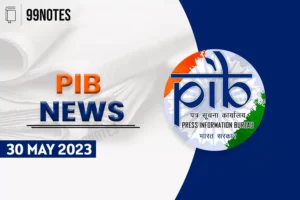
30 May 2023 : PIB
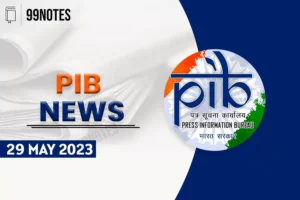
29 May 2023 : PIB

29 May 2023 : Daily Current Affairs
Daily Current Affairs 2 Jun2 2023 : Daily Current Affairs The Hindu Editorial
12-May-2023
Daily Current Affairs For UPSC ,The Hindu Editorial Summary
Facebook-f
Twitter
Youtube
1.Marriage…
PIB 1 June 2023 : PIB PRESS INFORMATION BUREAU
1-June-2023
Daily Current Affairs For UPSC ,The PIB ( Press Information Bureau…
The Hindu 1 June 2023 : The Hindu Editorial The Hindu Editorial
1-June-2023
Daily Current Affairs For UPSC ,The Hindu Editorial Summary
Facebook-f
Twitter
Youtube…
Daily Current Affairs 1 June 2023 : Daily Current Affairs DAILY CURRENT AFFAIRS
1-June-2023
Daily Current Affairs For UPSC ,Daily Current affairs of The hIndu…
The Hindu 31 May 2023 : The Hindu Editorial The Hindu Editorial
31-May-2023
Daily Current Affairs For UPSC ,The Hindu Editorial Summary
Facebook-f
Twitter
Youtube…
PIB 31 May 2023 : PIB PRESS INFORMATION BUREAU
31-May-2023
Daily Current Affairs For UPSC ,The PIB ( Press Information Bureau…
Daily Current Affairs 31 May 2023 : Daily Current Affairs DAILY CURRENT AFFAIRS
31-May-2023
Daily Current Affairs For UPSC ,Daily Current affairs of The hIndu…
PIB 30 May 2023 : PIB PRESS INFORMATION BUREAU
30-May-2023
Daily Current Affairs For UPSC ,The PIB ( Press Information Bureau…
PIB 29 May 2023 : PIB PRESS INFORMATION BUREAU
29-May-2023
Daily Current Affairs For UPSC ,The PIB ( Press Information Bureau…
Daily Current Affairs 29 May 2023 : Daily Current Affairs DAILY CURRENT AFFAIRS
29-May-2023
Daily Current Affairs For UPSC ,Daily Current affairs of The hIndu…



